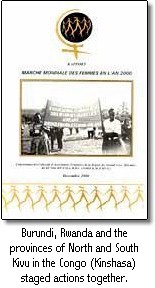Many groups organized specifically to strengthen women's representation in political and decision-making bodies.

In Zambia, women chose to support female candidates in election campaigns at all levels - presidential, legislative and local - to elect "as many women as possible in key decision-making positions as a strategy for combatting poverty and violence against women."
Groups participating in the March in Mauritania also decided to support women candidates in the national and municipal election campaigns. Women in Guatemala ran in elections for the position of community leaders.
In Honduras, the Collective Against Violence, comprising nearly all the groups in the March national coordinating body, presented their demands to candidates in the presidential election campaign.
In Mozambique, Forum Mulher, the March coordinating organization, became a major player in the reconstruction of flood-stricken areas. They are involved in the "Gender and Emergencies" project whose mandate is to ensure that women benefit from reconstruction programs.
In Rodriguez, on October 17, 2001, 100 women "convened" the island's director of health services, director of fisheries and the police superintendent for a progress report on the demands they had presented a year earlier. They drafted new proposals and concluded that "there is now heightened awareness of women's demands and much has been accomplished."
Progress fighting violence against women
Women in Rwanda succeeded in breaking the silence around violence against women and girls. On the question of poverty, they believe that women now understand "that they need to create revenue-generating projects."
A member of the March in Romania observes that there is "growing interest there concerning women's issues, particularly among women workers. The general perception of violence against women has changed."
"We have shown that we are not afraid to join the international women's movement and that we are independent," declare Russian women.
In Jordan, "the national platform has become a reference in developing the socio-economic development plan," says a member of the national coordinating body.
In Québec, the government allocated funds for battered women's shelters, violence against women prevention programs aimed at children, construction of social housing, and increased social assistance benefits; however, the amounts fell far below what women's groups had demanded.




